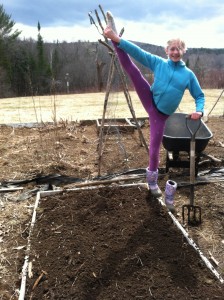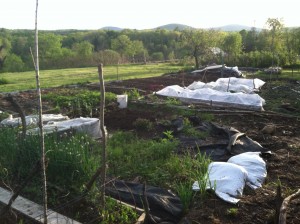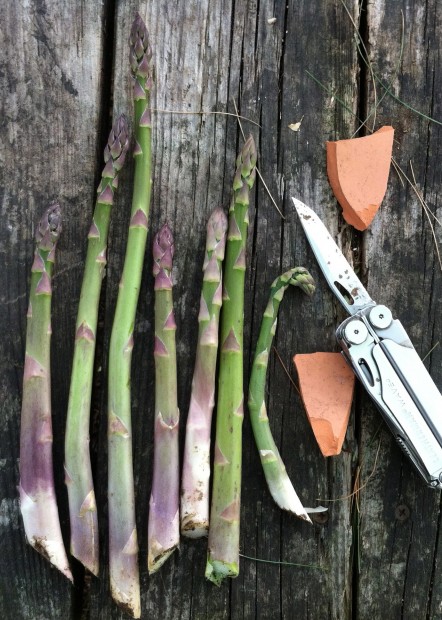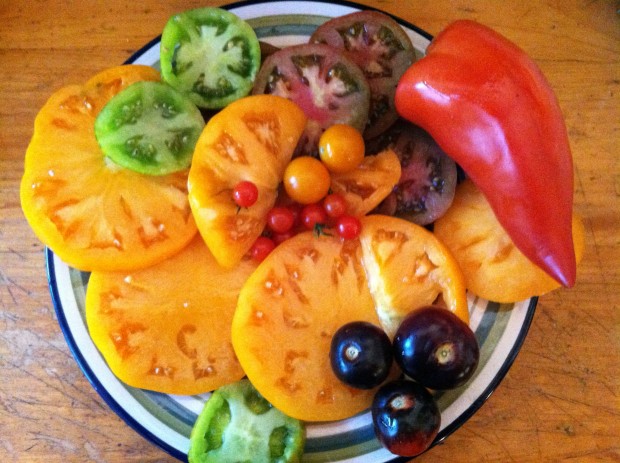Bad Advice Wednesday: Tend Your Garden
categories: Bad Advice / Cocktail Hour
2 comments
I’ve been in the garden a lot these last weeks, enjoying being able to, for one thing, but also getting beds ready and planting and even harvesting: greens galore, and asparagus, and spring garlic, and parsnips, Jerusalem artichokes, radishes, leaves of perennial herbs. The garlic I planted last October before book tour, the lettuce in late February: seeds on snow in a cold frame. The asparagus twenty years ago. Twenty years! I dug a ditch and filled it with composted cow manure from my generous neighbor, dropped the crowns in, buried them, covered the soil with straw. A year later, first shoots. I ate only one–you’ve got to let that plant develop. Second year, three or four spears. Third year a couple of meals. And as much as I could eat most years after that, a lot of it just sliced off below the soil line, brushed on my sleeve, and into my mouth, complex flavors you don’t taste after a day or two, or don’t get at all in less developed soil or with chemical as opposed to organic fertilizer (organic meaning decomposed plant matter, which is to say healthy soil).
 It’s easier and easier, all this work. I don’t pound away with the rototiller anymore, stomping along behind, packing the earth, impatient. Instead I keep beds year-to-year, turn them in spring with a garden fork, muscle power alone, the soil more friable every year, more consistent, darker, richer, easier to work. I know more, too, and get so much more done in so much less time. I recognize weeds at the seedling stage, recognize them by name like old friends. And pluck them out. I know that today things might look ragged, but that in a week order just might return. I know how much is up to me, and how much is up to the plants, and how much can be thwarted or encouraged by the weather, things out of my control. And I know when it’s time to plant, time to feed, time to harvest.
It’s easier and easier, all this work. I don’t pound away with the rototiller anymore, stomping along behind, packing the earth, impatient. Instead I keep beds year-to-year, turn them in spring with a garden fork, muscle power alone, the soil more friable every year, more consistent, darker, richer, easier to work. I know more, too, and get so much more done in so much less time. I recognize weeds at the seedling stage, recognize them by name like old friends. And pluck them out. I know that today things might look ragged, but that in a week order just might return. I know how much is up to me, and how much is up to the plants, and how much can be thwarted or encouraged by the weather, things out of my control. And I know when it’s time to plant, time to feed, time to harvest.
 People often ask how to get their story published, their poem, get their book idea noticed, sold. “I’m going to write the first draft by January,” they’ll enthuse, excited and terrified by their own ambition. “And then get the revision in by February.”
People often ask how to get their story published, their poem, get their book idea noticed, sold. “I’m going to write the first draft by January,” they’ll enthuse, excited and terrified by their own ambition. “And then get the revision in by February.”
Okay, fine. These things can be done quickly, it’s true. You can plant a radish seed practically anywhere and be eating an actual radish in 25 days. You can pluck dandelion leaves off the ground early-early season.
But if you want more than radishes, something more refined than (delicious) dandelions, better to work on the garden whole. That’s the work that counts. Every sentence written is your compost, and a lot is needed, over many years, broken down by time. Even shit gets reborn. Rewards come as tomatoes, say, more and better some years than others. Or carrots. Or cabbage. Or peas (peas!). But after the tomatoes are harvested, the carrots, the cabbage, the peas, you want the garden to remain, want not to have to dig a new one every time you want a crop.
That’s all. Work on the garden, and the harvest will take care of itself.




Wow! Perfect! Beautiful! I mean the spindly leg creature, of course. If only a bird would land on that marvelous toe.
And look at all those colors. I have never seen a harvest like that. Yummy!
Thanks for this, Bill. And don’t forget the surprise frost just when the first rows are popping up. There’s something there, too…